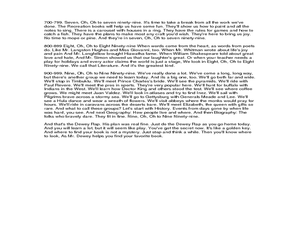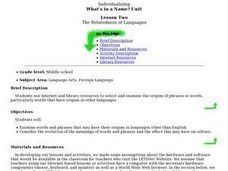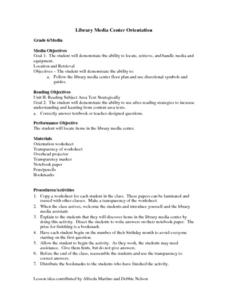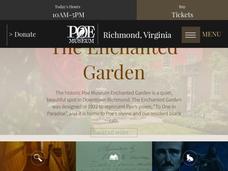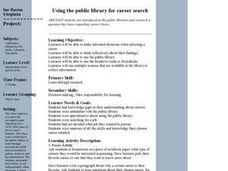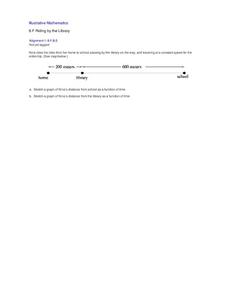Curated OER
Where is Grand Dewey Daddy?
Third graders find books. In this library lesson, 3rd graders use the Dewey Decimal System to find books and determine the shelves they are located on.
Curated OER
Dewey Rap
Fourth graders locate books in the library. In this Dewey Decimal System instructional activity, 4th graders listen to the Dewey Rap via power point or audio file. Students view a card from the Dewey system in their library and practice...
Curated OER
America at the Centennial
High schoolers explore centennial America. In this American history lesson, students search the Library of Congress digital collections for primary sources regarding the lifestyles and values of Americans in 1876. High schoolers design...
Curated OER
The American Dream
Students define the American dream. For this primary research lesson, students search the Library of Congress digital collections for primary sources regarding the ideal of the American dream. Students create presentation to...
Curated OER
The Relatedness of Languages
Young scholars use Internet and library resources to select and examine the origins of phrases or words, particularly words that have origins in other languages.
Curated OER
Glossary, Index, and Table of Contents
Fourth graders use two separate sources to learn about index, glossary, and table of contents usage. In this library instructional activity, 4th graders use two books, Learning About Weather with Graphic Organizers, and The World Almanac...
Curated OER
More Amazing Americans: A WebQuest
Learners research amazing Americans using America's Library. In this American heroes lesson, students identify criteria for amazing Americans. Learners copy and paste text and graphics from websites to use in their own documents....
Curated OER
Creating a Primary Source Archive: All History Is Local
Students explore personal, local, state, and national history. In this historiography lesson, students search the Library of Congress digital collections for primary sources regarding their family histories framed in local, state, and...
Curated OER
Science Topics and Presentations
Students go to the library and use computers to research a science topic and work on their presentations. In this presentations lesson plan, students use overhead transparencies and use props for a skit.
Curated OER
Using Informational Books: Index, Table of Contents & Alphabetical Order
Students recall and use previous knowledge of the library's reference and nonfiction sections. Also they utilize various forms of reference (encyclopedias & dictionaries) and nonfiction books.
Curated OER
Chain Together A Book Report
Individuals examine a book's components, including key events, characters, and vocabulary and develop "chain book reports" with their peers. Strips of paper containing the book's important events are staples together and hung.
Curated OER
Social Studies: World Cultures and the Library of Congress
Students use the Library of Congress Website to locate information for a world cultures project. They select countries to research, investigate visa information, currency, climate, and accommodations. Students follow the directions on...
Curated OER
Library Lesson Plan: Table of Contents
Third graders create a table of contents. In this library skills lesson, 3rd graders read Welcome to the White House and use the provided worksheet to create a table of contents for the book.
Curated OER
Sorting
Students practice sorting books. In this sorting lesson, students play the Flood Game on the PBS web site. With knowledge of the sorting system used by libraries, students sort small numbers of books using categories devised by their...
Curated OER
Reader's Paradise
Pupils visit the school or local library (or bookstore) to create short film or radio documentary that records a specific habit or ritual associated with reading, book buying, or book borrowing.
Curated OER
Library Media Center Orientation
Sixth graders demonstrate the ability to follow the library media center floor plan and use directional symbols and guides. They also use after-reading strategies to increase understanding and learning from content area texts.
ReadWriteThink
Dear Librarian: Writing a Persuasive Letter
Everyone deserves to read a great book! Here, pupils write a persuasive letter to the school's librarian detailing their favorite story and why it should be found on the shelves. Class members' persuasive reading passages are shared with...
Curated OER
Genetics: A Library/Research Skills and Technology Lesson Plan
Genetic issues, inherited diseases, and genetic engineering are hot topics in scientific fields and provide an opportunity for young scientists to develop their research and presentation skills. Each class member chooses a topic, locates...
Curated OER
Library Media: Poetry
Fifth graders explore different kinds of poetry. They work in groups to collect different styles of poetry. Then they use charts to organize the attributes of various poems. Conclude the lesson by having each individual choose the style...
Library Sparks
Bridge to Terabithia: Library Lessons
Foreshadowing, flashbacks, and imaginary places are the three topics of focus in this two-lesson packet written especially for the book, Bridge to Terabithia. Each lesson also comes with worksheets and activities to support student...
Curated OER
Read It, Don't Eat It!
Young scholars complete activities based on the book Read It, Don't Eat It! In this library rules lesson, students are read a story that illustrates library rules, then match the rules with pictures and complete a maze.
Curated OER
The Evolution of the Book: Introducing Students to Visual Analysis
Students demonstrate visual literacy skills by analyzing the images from the mural in the Library of Congress. In this visual art analysis lesson, students examine the mural and further their knowledge by using tools of art and design to...
Curated OER
Using the Public Library for Career Search
Learners make informed decisions when selecting a career.
Illustrative Mathematics
Riding by the Library
Draw a graph that shows the qualitative features of a function that has been described verbally. Make sure learners understand where time is zero and the distance is zero. It may take them some time to understand this concept, so working...
Other popular searches
- The Library of Congress
- Map of a Library
- End of Year Library Activities
- Purpose of Classroom Library
- Photo of School Library

